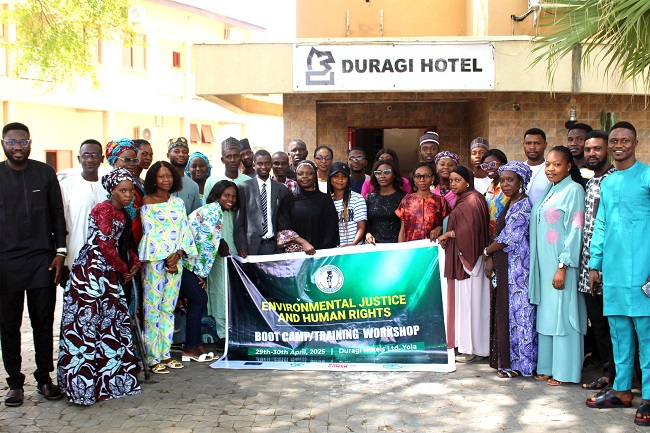The Sustainable Education and Livelihoods Foundation (SELF) has commended the Women Environmental Programme (WEP) for its work in empowering communities and promoting human rights through environmental justice.

In an interview during the just-concluded bootcamp hosted by WEP on April 29 and 30, 2025, in Yola, the capital of Adamawa State, Hyellagiziya Fakuta, founder and CEO of SELF, expressed her gratitude for the experience, describing it as both enlightening and deeply impactful.
“Not only for me personally, but for the strategic direction and growth of our organisation,” the SELF chief added.
The bootcamp, she went on to explain, provided a platform for participants to explore significant issues at the intersection of environmental protection, human rights, and sustainable development.
Elaborating further, Fakuta hinted that the exercise was not just informative — it was practical and transformative and has strengthened SELF’s vision and strategy and deepened its commitment to bridging the gap between grassroots realities and national policy.
According to her, the issues covered during the event expanded her knowledge of how environmental degradation is inextricably tied to basic human rights, particularly in marginalised communities. It also reaffirmed how vital it is to incorporate environmental justice into SELF’s livelihood and education initiatives.
She observed that the topic of gender equity as a pathway for sustainable development highlighted the critical role of women in achieving environmental sustainability, emphasising that the practical strategies shared during this session will assist her organisation in designing more inclusive and gender-responsive programmes that will uplift women and promote equity.
Civil society organisations (CSOs) play a critical role in advancing gender parity in environmental governance. By gathering and evaluating data, promoting culturally aware human rights, keeping an eye on the effects of policies, and organising communities, they operate as change agents.
In light of this, the SELF boss asserts that the discussion of CSOs’ role in promoting gender equality in environmental governance has “equipped us with new tools and motivation to be a stronger voice for the people we serve.”
As a result, on behalf of her establishment, she expresses profound gratitude to WEP for conducting the impacting training in her state.
“Your commitment to empowering organisations like ours is helping to build a more just, inclusive, and sustainable future for all,” Fakuta stated.
By Etta Michael Bisong, Abuja
